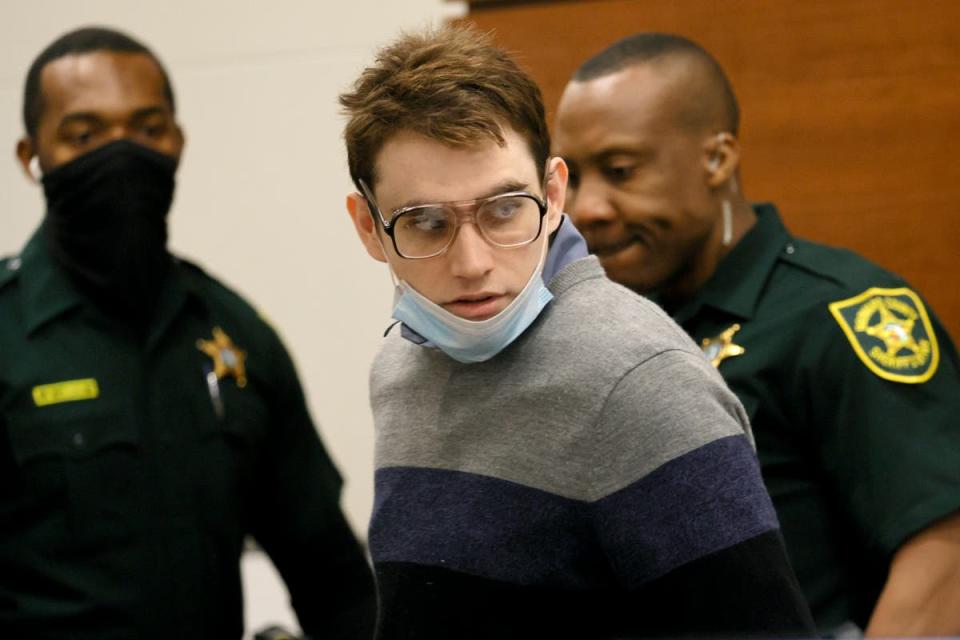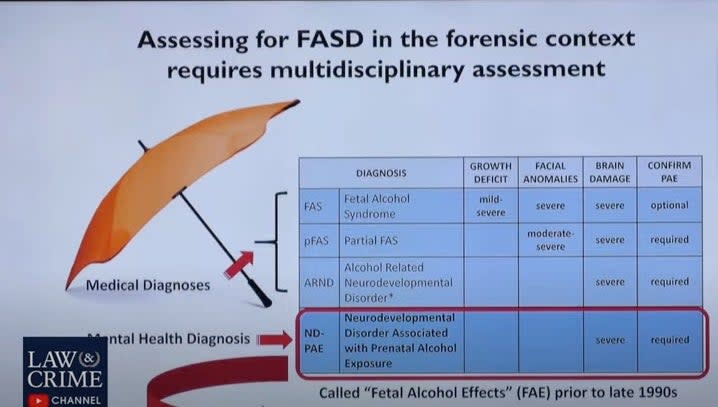Nikolas Cruz sentencing - live: Parkland shooter trial hears testimony from fetal alcohol syndrome expert
The sentencing trial for Parkland shooter Nikolas Cruz resumed in court in Broward County, Florida, on Monday morning, following a one-week break.
Cruz, then aged 19, murdered 17 students and staff members in the mass shooting at Marjory Stoneman Douglas High School on Valentine’s Day 2018.
The massacre remains one of the deadliest mass shootings in US history.
Cruz, now 23, pleaded guilty in October 2021 to 17 counts of murder and 17 counts of attempted murder.
Jurors will now decide whether to sentence him to death or to life in prison without the possibility of parole.
Prosecutors spent three weeks presenting graphic details of how Cruz plotted and carried out the attack, footage of him calmly going to a nearby Subway and McDonald’s in the immediate aftermath and heartbreaking testimony from the victims’ families.
The defence is continuing to present its case, where it is seeking to show that Cruz suffered from behavioural and developmental issues and endured a troubled upbringing – and did not receive the appropriate help he needed.
Key points
Cruz watched his father suddenly die, says witness
Shooter’s mother was ‘afraid’ of him
Chilling jailhouse drawings released
Cruz sat with victim’s brother in McDonald’s moments after shooting
What are foetal alcohol spectrum disorders (FASD)?
19:30 , Rachel Sharp
One of the key parts of the defence’s argument is that he suffers from fetal alcohol spectrum disorders (FASD) caused by his biological mother abusing alcohol and drugs while pregnant.
FASDs are conditions caused by an individual being exposed to alcohol in the womb before birth.
According to the CDC, alcohol is passed from the mother’s blood to the baby via the umbilical cord.
It is surprisingly common, occurring in up to 1 in every 20 people, according to FASD United.
The effects of FASD can vary but typically include both physical problems and behavioural and learning problems.
Signs and symptoms include: learning disabilities, small head size, hyperactive behaviour, poor reasoning and judgment skills, difficulty in school and intellectual disability, among other things.
The Independent’s Rachel Sharp has the full story:

Nikolas Cruz: What are fetal alcohol spectrum disorders?
Nikolas Cruz had a horror start to life but does it matter in trial?
19:00 , Rachel Sharp
It began before he was even born: Nikolas Cruz’s biological mother drank alcohol and abused drugs while he was still in the womb.
At the age of five, his adoptive father suddenly collapsed and died in front of him in the family home.
In his teenage years, he was allegedly bullied by his brother and sexually abused by a so-called “trusted peer”.
At 19, he became an orphan when his adoptive mother died from pneumonia.
And just three months later, he murdered 17 innocent students and staff in a shooting rampage at his former high school.
“Without any one of those problems, it may never have happened,” Abigail Marsh, professor in the Department of Psychology and the Interdisciplinary Neuroscience Program at Georgetown University, tells The Independent.
“For any given person there is a causal explanation, a link… and, on average, people who become mass shooters or are very violent have had these experiences or risk factors. There’s no one thing that you can say that is the reason but, together, a perfect storm of risk factors can give the means, motive and opportunity.”
These so-called risk factors have all come into focus in recent weeks as Cruz’s team of public defenders tries to convince a jury of his peers that his life should be spared.
The Independent’s Rachel Sharp details what jurors have learned about Cruz’s start in life and speaks to a psychologist and criminal defence attorney about what impact this truly had on him committing his crime and whether or not it will make any difference in the eyes of the jury:

Parkland shooter Nikolas Cruz may have had a horror start to life but does it matter?
Court breaks for lunch
18:30 , Rachel Sharp
The court is on lunchtime recess.
Jurors will return to the courtroom at 2.30pm ET.
Doctor details neuropsychological assessment of Cruz
18:11 , Rachel Sharp
Dr Connor began to explain the results of his neuropsychological assessment of Cruz.
The expert was hired by the defence to carry out the assessment ahead of Cruz’s trial.
He testified that Cruz showed deficits in nine of the 11 domains assessed.
These domains include: IQ, academic, memory, visual/spatial, attention, processing speed, motor skills, executive functioning , suggestability, direct adaptive function and informant adaptive function.
Records show Cruz exposed to alcohol in womb
18:04 , Rachel Sharp
Official records show that Nikolas Cruz was exposed to alcohol in the womb as his biological mother Brenda Woodard abused drugs and alcohol while pregnant.
Dr Connor testified that adoption records, birth records and testimony from Woodard’s daughter Danielle Woodard and friend Carolyn Deakins all show this alcohol exposure.
The adoption records show that Woodard admitted to drinking beer three times a week in the first five weeks of pregnancy, as well as past use of drugs.
Later in her pregnancy, she then admitted that she drank throughout the first three months of her pregnancy and smoked a pack of cigarettes daily.
Birth records detail that the patient “admits to alcohol abuse” and to being in treatment, jurors heard.
Dr Connor said that the use of the word “abuse” is significant, as it suggests greater quantities of alcohol. He also said that experts often have less evidence of alcohol exposure than the official records that were available for Cruz.
Doctor describes traits found in FASD sufferers
17:41 , Rachel Sharp
Dr Connor described the traits often found in FASD sufferers.
The FASD expert said that prenatal alcohol exposure leaves individuals with cognitive and behavioural impairments.
The individual will often have deficits in cognitive or developmental capabilities, executive functioning, motor functioning, attention or hyperactivity and social skills.
Jurors shown slides about FASD
17:15 , Rachel Sharp
Jurors were shown slides explaining what FASD is and the different diagnoses.
While sometimes the individual will have physical features of FASD, other times they won’t but they will still have cognitive, behavioural conditions, said Dr Connor.
Research has found that alcohol is the most dangerous drug to a foetus, he said.
One study carried out on a mouse found that alcohol had destroyed cells in a foetus within just 12 hours of the mother consuming alcohol.
Dr Connor testified that he was asked to conduct neurological evaluation on Cruz to see if he has FASD and said that he had spent around 145 hours on his case.

Doctor is expert in FASD
17:00 , Rachel Sharp
Dr Paul David Connor is a clinical neurpsychologist who specialises in foetal alcohol spectrum disorders (FASD).
FASDs are conditions caused by an individual being exposed to alcohol in the womb before birth.
The effects of FASD can vary but typically include both physical problems and behavioural and learning problems.
Signs and symptoms include: learning disabilities, small head size, hyperactive behaviour, poor reasoning and judgment skills, difficulty in school and intellectual disability, among other things.
Cruz’s defence is arguing that he suffers from FASD caused by his biological mother Brenda Woodard abusing alcohol and drugs during pregnancy.
First witness to begin testimony
16:40 , Rachel Sharp
The day’s session finally got under way on Monday morning following a lengthy delay over what evidence the first witness can speak about in court.
Dr Paul David Connor is testifying remotely.
Following the toing and froing between the defence and prosecution on Monday morning, the judge told the doctor that he can testify that he is aware that Cruz’s biological mother Brenda Woodard used crack cocaine and alcohol during pregnancy.
He can also five his expert opinion and can speak about the birth records and adoption records.
But he cannot speak about statements Woodard made in an interview with Dr Heather Holmes.
Court takes 15-minute recess before testimony begins
15:46 , Rachel Sharp
The court has taken a 15 minute recess before testimony will finally get under way.
The day’s proceedings have been delayed as the judge ruled on the admission of evidence.
After the break, jurors will enter the courtroom and the defence will call its first witness for the day.
Prosecutor objects to pictures of mouse foetus
15:29 , Rachel Sharp
As well as testimony from Woodard, prosecutors also raised several objections to other slides which the defence plans to show to the court.
The slides include pictures of a mouse foetus which has been exposed to alcohol. The research is part of the defence’s argument that Cruz suffers from foetal alcohol syndrome disorders (FASD) because his biological mother abused alcohol when pregnant.
The judge overruled the prosecution’s objection, allowing the picture to be shown in court.
Prosecutors also objected to slides which included scientific studies. The judge said several of the questions or issues raised by the state could be brought under cross-examination.
Court gets off to slow start amid dispute over witness’s slides
15:05 , Rachel Sharp
The court session got off to a slow start on Monday morning as the defence and prosecution got into an immediate dispute over a witness.
Prosecutors said that they had filed a motion to strike some slides which the first witness for the defence would show to the court.
Among the slides are statements made by Cruz’s biological mother Brenda Woodard to a doctor.
When the judge asked if the defence could call a different witness to give her time to review the motion and rule on it, the defence said it did not have anyone else ready.
The defence and prosecution then went to the sidebar to discuss the slides and resolved some of the issues before arguing before the judge.
Prosecutors argued that bringing the evidence is double hearsay as Woodard is no longer alive. They also argued that the defence did not list her as a witness or bring up her conduct during pregnancy prior to her 2021 death – leaving prosecutors with no opportunity to cross examine Woodard.
The judge told the defence to amend the slides.
RECAP: The defence’s case
14:30 , Rachel Sharp
In the two weeks since the defence began presenting its case, jurors have heard testimony from 24 witnesses comprising of relatives, neighbours, teachers, psychiatrists, psychologists and law enforcement officers who encountered Cruz at some point in his 19 years leading up to the massacre.
They spoke about Cruz’s troubled start in life, the challenges in his upbringing, and the behavioural and psychological difficulties he presented from a very early age – and which many say were not properly addressed.
Jurors heard testimony from Cruz’s half-sister who said that their biological mother drank and abused drugs while she was pregnant with him. The defence said that left him with foetal alcohol syndrome.
Witnesses also testified about the disturbing behaviour he showed from an early age, with Cruz receiving psychiatric help from the age of three.
Family friends also described how Cruz was affected by the deaths of his two adoptive parents. Aged five, Cruz witnessed his adoptive father die from a heart attack in the family home.
Three months before the Parkland massacre, his adoptive mother died from pneumonia.
RECAP: The prosecution’s case
14:15 , Rachel Sharp
For three weeks, prosecutors presented harrowing testimony and evidence about Nikolas Cruz’s attack at Marjory Stoneman Douglas High School.
Jurors heard graphic details of how Cruz plotted and carried out his attack and were shown the AR-15-style semiautomatic rifle he had used to murder 17 innocent victims.
Surveillance footage showed Cruz stalking the hallways of the freshman building, killing as many students and staff members as he could, and survivors testified about the moments they saw their fellow students and teachers die.
Footage was also shown of Cruz in the immediate aftermath of the massacre, revealing how he calmly went to a nearby Subway for a drink and then onto a McDonald’s where he sat down and spoke with a student whose sibling he had shot just minutes earlier.
Grieving family members of his 17 victims broke down in tears on the witness stand as they spoke about their loved ones and the toll that day his actions have taken on the people they left behind.
Jurors also toured the school site and saw the blood-stained corridors and classrooms just as they were left in the aftermath of the massacre.
Sentencing trial to resume
13:56 , Rachel Sharp
The sentencing trial for Nikolas Cruz will resume in Broward County Court at 9.30am ET on Monday morning.
Jurors were given a one-week break last week for the Labor Day holiday and because one of the attorneys had training scheduled for that time.
The defence will now resume its case, continuing to call witnesses to testify to Cruz’s troubled upbringing and behavioural and emotional challenges.

